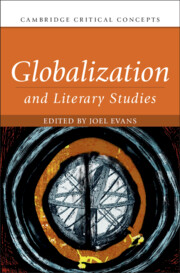Book contents
- Globalization and Literary Studies
- Cambridge Critical Concepts
- Globalization and Literary Studies
- Copyright page
- Contents
- Figures
- Tables
- Contributors
- Acknowledgements
- Introduction
- Part I Origins
- Part II Development
- Part III Application
- Chapter 15 The Globalization of the Enclave
- Chapter 16 Geopolitics and the Novel
- Chapter 17 Spy Fiction in the Age of the Global
- Chapter 18 The Twenty-First-Century Global Slave Narrative Trade
- Chapter 19 Planetary Poetics
- Chapter 20 Addressing Globalization in the Anthropocene
- References
- Index
Chapter 19 - Planetary Poetics
from Part III - Application
Published online by Cambridge University Press: 01 April 2022
- Globalization and Literary Studies
- Cambridge Critical Concepts
- Globalization and Literary Studies
- Copyright page
- Contents
- Figures
- Tables
- Contributors
- Acknowledgements
- Introduction
- Part I Origins
- Part II Development
- Part III Application
- Chapter 15 The Globalization of the Enclave
- Chapter 16 Geopolitics and the Novel
- Chapter 17 Spy Fiction in the Age of the Global
- Chapter 18 The Twenty-First-Century Global Slave Narrative Trade
- Chapter 19 Planetary Poetics
- Chapter 20 Addressing Globalization in the Anthropocene
- References
- Index
Summary
This chapter articulates what it calls a ‘planetary poetics’. To set the stage for his presentation, Moraru underscores that not only are ‘globe’ and ‘planet’ hardly equivalent, but they are not givens either. Rather, he argues, ‘globe’ and ‘planet’ are products, something done to the world, made in and out of it. World-making and remaking forms, they are outcomes of worlding, that is, of highly complex, interrelated changes leading to intensified and vastly transformative interactions of the world’s various parts economically, culturally and otherwise, much though the same world’s animate and inanimate systems, at whose expense socio-economic growth and integration have been de facto unfolding, have been concomitantly coming under unprecedented threat or even disintegrating. Where a certain poverty of the critical imagination limits standard takes on the late global era to self-congratulatory ‘uncovering’ of the world-as-globe realities, Moraru’s planetary approach enriches this conventional critical vista by recovering a more nuanced, present-grounded yet future-oriented picture. A record of world-making or world-poiesis, this picture lends itself to a reading whose job is a reverse engineering of sort of planetary poetics by attending to the worldings that have led to the world geocultural aggregate as we know it.
Keywords
Information
- Type
- Chapter
- Information
- Globalization and Literary Studies , pp. 305 - 317Publisher: Cambridge University PressPrint publication year: 2022
Accessibility standard: Unknown
Why this information is here
This section outlines the accessibility features of this content - including support for screen readers, full keyboard navigation and high-contrast display options. This may not be relevant for you.Accessibility Information
- 1
- Cited by
